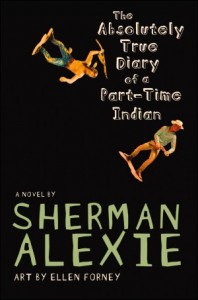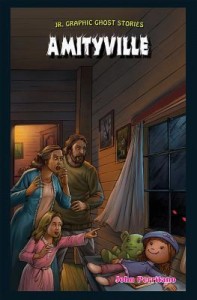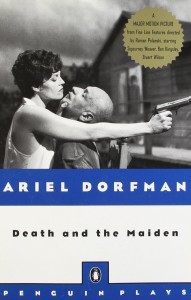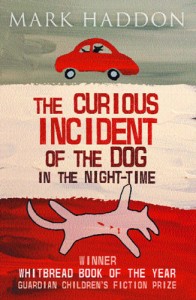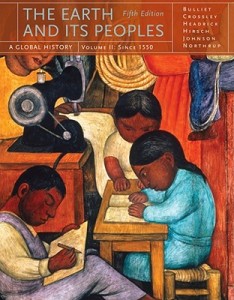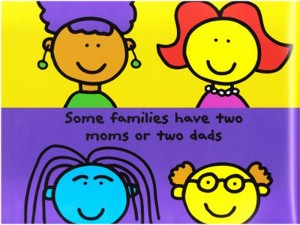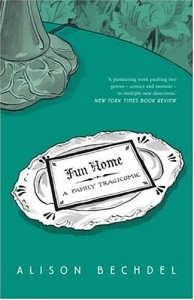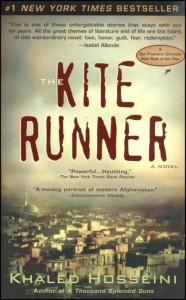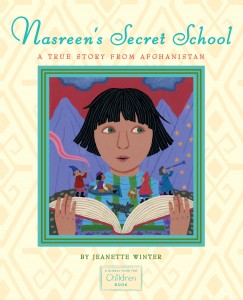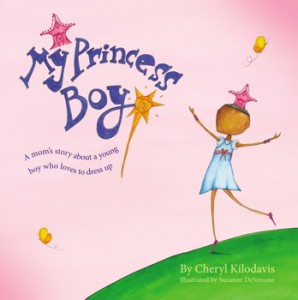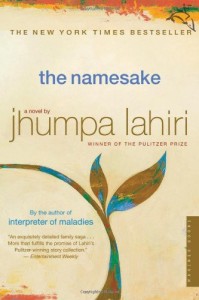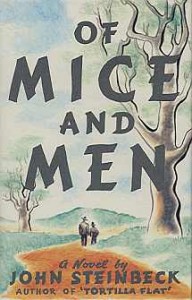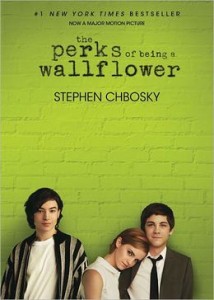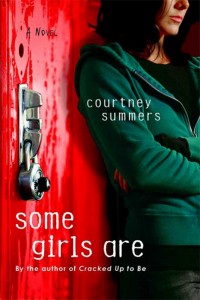Whether we were defending graphic novels or children’s books, defending books in elementary schools or colleges, 2015 proved to be a challenging year for free speech. CBLDF frequently joined coalitions to tackle book challenges and much more in 2015!
Absolutely True Diary of a Part-Time Indian by Sherman Alexie (Waterloo, Iowa)
In March, curriculum director Debbie Lee in Waterloo, Iowa, supported by superintendent Jane Lindaman, attempted to remove Sherman Alexie’s Absolutely True Diary of a Part-Time Indian from middle school classrooms. Lee and Lindaman maintained that the challenge procedure is not necessary in this case because they agree with the parent’s complaint. Lindaman went so far as to claim that the book is “inarguably inappropriate for such young minds,” but several teachers pushed back against that contention. In response to an email from Lee ordering the book’s removal, for instance, eighth grade literacy teacher Kevin Roberts noted that several of his students “told him it was the only book they had ever read they actually liked.”
In response to the disregard of district policy on handling challenged materials, CBLDF joined KRRP in a letter urging the board to reconsider their decision and give the book a fair hearing before banning it from the middle school curriculum.
Amityville: Jr. Graphic Ghost Stories by John Perritano (Knightdale, North Carolina)
CBLDF joined Kids’ Right to Read Project to protest the removal of Amityville: Jr. Graphic Ghost Stories from the Lake Myra Elementary School library in Knightdale, North Carolina. Despite violating school policy, the book was pulled from the Wake County school library earlier this month after a parent complained to school officials about the book’s subject matter.
Amityville is part of a series of graphic novels that retell famous ghost stories for young readers in grades 3-6. Intended to appeal to reluctant readers, the graphic novel recounts the infamous story of the Amityville Horror House and includes a brief context of the legend as well as summaries of other similar stories from around the world. Parent Kay Walker confronted Lake Myra school officials after her son checked out the book and insisted that the book not only be pulled from the Lake Myra school library, but from the Wake County school district as a whole, citing its “inappropriate” subject matter.
Upon issuing her complaint, Walker was notified that the book had already been pulled from the library — an action that is in direct violation of the school district’s policy on handling challenged materials, which requires a book be reviewed by a committee prior to its removal. In the letter, KRRP reminds Wake County school officials that the removal of Amityville from the school library without following proper procedure “is not only constitutionally suspect, but would also leave school officials vulnerable to multiple, possibly conflicting demands” in the future.
Cal by Bernard MacLaverty and Death and the Maiden by Ariel Dorfman (Rumson, New Jersey)
In response to an online petition calling for the removal of Ariel Dorfman’s play Death and the Maiden and Bernard MacLaverty’s novel Cal from the curriculum at Rumson-Fair Haven Regional High School in Rumson, New Jersey, CBLDF joined the Kids’ Right to Read Project in October to send a letterurging school district administrators “to make curricular decisions based on artistic and educational merit, and not based on the views of a small number of community members.”
The petition argued that the two books were age-inappropriate and as such should not only be banned, but should also be reason to implement a policy “whereby parents must sign a permission slip if assigned reading material, films or any media contains profanities, explicit sexual passages or vulgar language such as Fuck, Twat, Tits, Dick, etc.” As KRRP pointed out in their letter, the banning of the two books which have been used in junior and senior high schools for years would be a disservice to their students and the implementation of a permission slip policy would overly complicate and bring chaos into the educational process. As opposed to the permission slip policy, though, KRRP noted that creation of a set procedures for handling challenged materials would be a productive way of preventing issues like this from occurring in the future.
In November, a review committee determined that the literary merit of the two books warranted them remaining part of the Rumson-Fair Haven Regional High School curriculum.
The Curious Incident of the Dog in the Night-Time by Mark Haddon (Leon County, Florida)
Although The Curious Incident of the Dog in the Night-Time has received critical acclaim and been included in many curricula around the country, in August some parents in the Leon County, Florida, sent complaints to Lincoln High School principal Allen Burch about profanity and “religious skepticism” in the book. Burch then made the ad hoc decision to simply pull the book from the school’s summer reading list without consulting a review committee per policy. His reason for violating district policy: He wanted to “give the opportunity for the parents to parent.”
To challenge the decision, CBLDF joined the Kids’ Right to Read Project on a letter was sent to Principal Burch calling out the blatant violation of district policy and urging him to have the book reinstated and give a fair hearing by a review committee.
Although the school board stood by Principal Burch’s decision and the book was not returned to the Lincoln High School summer reading list, the school did encounter backlash from the community and one student in particular, who saw the ban as a violation of her educational rights and called the school out on their poor choice of action.
The Earth and Its Peoples: A Global History and World History: Connections to Today (Charlotte County, Florida)
In March, CBLDF joined NCAC to defend two history books used in 10th grade classrooms in Charlotte County, Florida. The Earth and Its People: A Global History and World History: Connections to Today came under attack by ACT! for America, a “non-profit, non-partisan, grassroots organization devoted to promoting national security and defeating terrorism.” The group claimed that the books promote an “Islamist agenda” and contain “specific inaccuracies and misrepresentations” and as such should be pulled from the AP History and general history classes that used the textbooks.
Although a review committee voted 8-2 to keep the books in the classes, subsequent complaints, mostly from local members of ACT!, led to a special school board meeting and the letter from NCAC, which urged the school to stand by their decision to protect the integrity of their educational system.
A few short days later, the school board convened voted unanimously to keep both textbooks in classrooms.
Extremely Loud & Incredibly Close by Jonathan Safran Foer (Mattoon, Illinois)
In October, CBLDF joined Kids’ Right to Read Project in sending a letter of protest to the principal of Mattoon High School in Mattoon, Illinois, after she ignored school district policy to pull the novel Extremely Loud and Incredibly Close from an Honors English class while students were in the middle of reading it. Due to complaints from parents about the some of the book’s content, principal Michele Sinclair made the abrupt decision to remove the title from the Honors English III class despite the fact that parents had an opportunity to opt their children out of reading the book — a condition outlined in the school’s policy for handling difficult material.
In the letter sent to principal Sinclair, KRRP urged her to “demonstrate your commitment to recognized constitutional and educational principles, as well as to the District’s own policy, by restoring Extremely Loud and Incredibly Close to the 11th grade curriculum.”
The Family Book by Todd Parr (Etiwanda, California)
In mid December, CBLDF joined the Kids’ Right to Read Project and other freedom to read advocates to defend Todd Parr’s The Family Book in the Etiwanda, California, school district. The parents of one formerly enrolled student want the book banned from transitional kindergarten classrooms due to its inclusion of families with same-sex parents.
The Family Book informs children via simple sentences and colorful pictures about all of the different types of families that exist: stepfamilies, mixed-race families, single-parent families, adoptive families, and so on. But the single page that draws the ire of some parents is the one that says: “Some families have two moms or two dads.” Although this is simply a factual statement which many children have likely already observed among their own friends and classmates, Ryan and Ashley McKeehan are pushing to ban the book because they say that page makes it “not age-appropriate” for elementary school students.
After a review committee decided in October that The Family Book should remain available to parents, students, and staff, the McKeehans appealed that decision to the school board, prompting the letter from KRRP.
Fun Home by Alison Bechdel, Persepolis by Marjane Satrapi, The Sandman Vol. 2 by Neil Gaiman, and Y: The Last Man Vol. 1 by Brian K. Vaughan and Pia Guerra (Crafton Hills College, California)
Tara Shultz, who is working towards an Associate Degree in English at Crafton Hills College in California, knew when she began an elective English course in January that it focused on graphic novels, but said she “expected Batman and Robin, not pornography.” Shultz contacted her parents, and the family challenged the inclusion of four of the ten books taught by Associate Professor Ryan Bartlett: Persepolis by Marjane Satrapi, Fun Homeby Alison Bechdel, Y: The Last Man Vol. 1 by Brian K. Vaughan and Pia Guerra, and The Sandman Vol. 2: The Doll’s House by Neil Gaiman and various artists.
The college stood by the books but suggested that a disclaimer would be added to the course syllabus, the only such course in the system that would have an administration-mandated warning. While the college’s refusal to remove the books is commendable, the decision to include a disclaimer on the syllabus was of concern to free speech and academic freedom advocates. In a letter to the college, NCAC notes that college is intended to be a time when students are challenged, often through complex and sometimes controversial reading material. Disclaimers pose an obstacle to academic freedom, creating potential for the exclusion of acclaimed literature from coursework over fear of offending students.
In July the school decided to abandon the idea and left the decision to discuss the course’s content up to instructors.
Just One Day by Gayle Forman (Rosemount, Minnesota)
CBLDF joined the Kids’ Right to Read Project and other freedom to read advocates to defend Gayle Forman’s Just One Day in a Minnesota school district.
Ben and Kandi Lovin, parents of a sixth grader in Rosemount, Minnesota, demanded the removal of Just One Day, citing “a graphic sex scene, underage drinking [and] date rape” as reasons for the removal. In a victory for the freedom to read, the review committee voted 7-4 to keep Gayle Forman’s Just One Day in district libraries, but the Lovins may appeal the decision to the school board.
The Kite Runner by Khaled Hosseini (Buncombe County, North Carolina)
Earlier this year, The Kite Runner was challenged by Lisa Baldwin, a parent and former school board member in Buncombe County, North Carolina, who objected to depictions of “homosexuality and sexually explicit scenes.” A school-level review committee decided in May that the book was appropriate for the Honors English class, especially since teacher Brooke Bowman gave students the option to skip the potentially disturbing rape scene or to choose an alternate reading assignment. Despite this fact, the book was pulled from the class so that it could be reviewed by a district-level review committee.
Although the latter unanimously recommended that the school board reinstate Hosseini’s novel, Baldwin appealed the decision further, claiming that the book “inaccurately assign[s] Judeo-Christian characteristics to a Muslim god.”
In a letter to the school, KRRP urged the board to not only return The Kite Runner to the curriculum, but also to take another look at the policy provision which says challenged books are removed from the classroom until the challenge is resolved. In July, it was a victory in North Carolina and the book was reinstated back in the class.
The Librarian of Basra and Nasreen’s Secret School by Jeanette Winter (Duval County, Florida)
Despite the fact that two children’s books — The Librarian of Basra and Nasreen’s Secret School — offer young readers a different perspective on oppression and censorship, some parents in the Duval County, Florida, voiced concerns that the books encourage children to engage with the materials in a religious manner — specifically that the books will encourage children to read the Koran and pray to Mohammad. They demanded that the books be removed from the third grade curriculum in the district and went so far as to start a petition.
Although neither book is religious and the school allowed parents to opt-out their children from reading the books, parents persisted in their attempts to have the books banned. In a letter to the school, KRRP reminded administrators that banning of the books would not only be a violation of the First Amendment but would also compromise the integrity of the schools educational system: “Decisions about instructional materials should be based on sound educational grounds, not on some individuals’ agreement or disagreement with the message or content of a particular book.”
My Princess Boy by Cheryl Kilodavis and Suzanne DeSimone and This Day in June by Gayle E. Pitman (Hood County, Texas)
In July, more than 50 Hood County, Texas, residents filed formal challenges against two LGBTQ themed children’s books — My Princess Boy by Cheryl Kilodavis and Suzanne DeSimone and This Day in June by Gayle E. Pitman and Kristyna Litten — claiming that the books promote “perversion” and “the gay lifestyle.”
Although these residents attempted to have the books moved from the children’s section to the adult section at local public libraries, the community and library director Courtney Kincaid stood behind the books noting that “we’re here to serve the entire community, not just certain religious groups or political groups. Lesbians and gays are in this community and they deserve to have some items in this collection.” In their letter defending the books, KRRP argued that pulling the books out of the children’s section violated the First Amendment. Eventually the community voted to keep the books on the public library shelves and in the children’s section.
The Namesake by Jhumpa Lahiri (Coeur d’Alene, Idaho)
CBLDF joined the Kids’ Right to Read Project and other freedom to read advocates to defend Jhumpa Lahiri’s The Namesake in the Coeur d’Alene, Idaho school district.
A teacher of 11th and 12th grade students had requested approval to use Lahiri’s award-winning novel about the immigration experience of an Indian-American family in the curriculum, but the district’s Ad Hoc Literature Committee voted 4-2 against it due to “ ‘explicit’ sex scenes that they say are ‘too graphic for whole group instruction.’” In a victory for the freedom to read, the school board voted 5-0 to adopt the proposed curriculum, including The Namesake.
Of Mice and Men by John Steinbeck (Coeur d’Alene, Idaho)
In May, CBLDF joined the Kids’ Right to Read Project and other free speech advocates to protest an Idaho school district review committee’s recommendation that John Steinbeck’s Of Mice and Men be restricted in the 9th grade curriculum. Some parents and review committee members claimed that the 1937 novella about migrant workers during the Great Depression contains too much profanity and is “too dark,” arguing that it should be restricted to only only select groups of students as opposed to being included as part of the general curriculum. As KRRP noted in their letter, though, by restricting the book, the school would disservice to their students: “One of the basic goals of the public education system is to endow students with the knowledge widely shared by other students across the country. Confronting complex and dark themes in literature is part of the educational mission of the schools. A school district puts its students at a distinct disadvantage if it fails to introduce them to the range of ideas that they will encounter in college and in life.”
Despite the attempt to have the book restricted, the school board rejected the committee’s recommendation, and the book was kept as part of the general 9th grade curriculum.
Palomar by Gilbert Hernandez (Rio Rancho, New Mexico)
When Catreena Lopez found objectionable material in Gilbert Hernandez’s critically acclaimed graphic novel Palomar after her 14-year-old son checked it out of the Rio Rancho, New Mexico, high school library, she didn’t simply file a challenge with the school — she took her objections to the local media. Calling the book “child porn,” Lopez attempted to have the book removed from the school library by painting a negative and wholly untrue picture of the book’s content.
CBLDF led the defense of the book and KRRP sent a letter to the school reiterated that Lopez was wrong in her assessment of Palomar and noting that the book could not be classified as obscene under the tenants of the Miller Test.
Although local media continued to present biased reporting on the book and the case presented by Lopez, in July the book was reinstated back in the Rio Rancho High School library but the victory wasn’t total: Anyone under the age of 18 now needs a parent’s signature to check out the book.
The Perks of Being a Wallflower by Stephen Chbosky (Wallingford, Connecticut)
The Perks of Being a Wallflower was challenged at Sheehan High School in Wallingford, Connecticut, where it was pulled from the freshman reading list as well as the school’s curriculum despite a review committee’s recommendation otherwise.
In a letter sent to Superintendent Salvatore Menzo and members of the school board, KRRP pointed out that the accession to the demand of one parent (Jean Pierre Bolat, who has been appointed to the school board since filing his challenge) contradicts existing district policy, which states that “while the Board of Education upholds the right of all parents to assess and evaluate their own children’s educational materials, it will resist any attempt to censor materials used by others.” The letter urged the board to undertake a review of Menzo’s decision, a process that is also laid out in policy.
Author Stephen Chbosky didn’t stay quiet and spoke out publicly about the poor decision made by the school. “The entire book is a blueprint for survival. It’s for people who have been through terrible things and need hope and support,” he explained. “The idea of taking two pages out of context and creating an atmosphere as perverse is offensive to me — deeply offensive.”
Some Girls Are by Courtney Summers (Charleston, South Carolina)
In July, Courtney Summer’s novel Some Girls Are was pulled from the optional summer reading list for freshman Honors English at West Ashley High school in Charleston, North Carolina, based on one parental complaint. Citing objections to the book’s depiction of underage drinking, drug use, and sexual assault, in a knee-jerk reaction to “accommodate the parent’s concern” Principal Lee Runyon had the book pulled from the reading list, bypassing district policy, which requires that challenged books be reviewed by the school board.
Shortly thereafter, CBLDF joined a coalition led by the Kids’ Right to Read Project, pointing out how Runyon’s decision not only violated district policy, but also the academic integrity of school’s curriculum. A formal letter was submitted to WAHS in the hopes that the school would rescind their decision and have the book reinstated in the optional reading list.
Although the decision to pull Some Girls Are from the optional summer reading list was not withdrawn, one former librarian, Kelly Jensen, started an immensely successful book drive to get copies of the book back into Charleston teens’ hands. Teaming up with librarian Andria Amaral, Jensen’s dream to collect maybe 15 to 20 copies of the book quickly escalated into 830+ donated books, over $600 in donated funds for shipping costs, a letter from author Courtney Summers, and a city-wide right to read event that challenged the school’s decision and got teens reading.
Some Girls Are may not have made its way back onto the reading list at WAHS, but due to the proactive efforts of Kelly Jensen and the Charleston community the book did make it into teen’s hands. “The image of teenagers being able to pick up this book, read it, and decide for themselves how they think — it’s powerful,” said Jensen. “And I can only imagine how excited they are when they learn that they not only get to read the book, but they get to keep it.”
Help support CBLDF’s important First Amendment work in 2015 by visiting the Rewards Zone, making a donation, or becoming a member of CBLDF!
Contributing Editor Caitlin McCabe is an independent comics scholar who loves a good pre-code horror comic and the opportunity to spread her knowledge of the industry to those looking for a great story!
